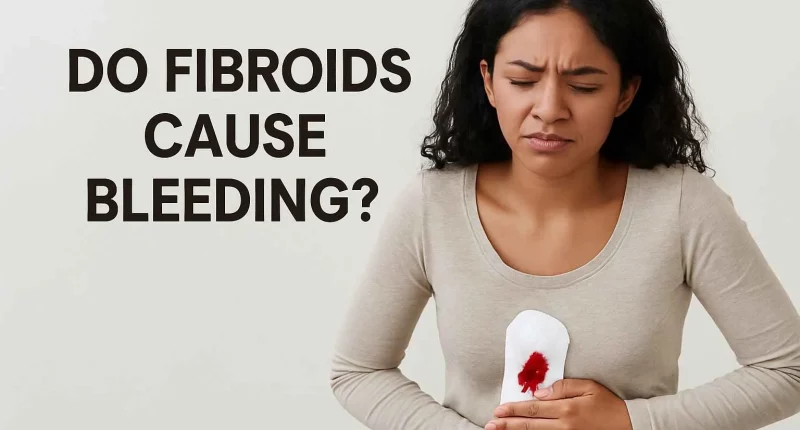Share this @internewscast.com
Have you ever questioned, “Why is my menstrual flow so heavy?” Countless women experience significant menstrual bleeding, yet many remain unaware of the underlying cause. A frequent yet often unnoticed reason is uterine fibroids. But do fibroids actually lead to bleeding, or is there another explanation?
Let’s explore this issue in depth and break it all down.
Uterine fibroids have been impacting women’s health for centuries, causing discomfort, pain, reproductive challenges, and notably, heavy bleeding. These non-cancerous tumors develop within or on the uterus. While some women may be unaware of their presence, others face daily struggles.
So, do fibroids lead to bleeding? Indeed, they frequently do. In fact, many women fail to associate their heavy menstrual cycles with fibroids until it becomes problematic. This is why gaining knowledge is crucial, allowing women to manage their health proactively.
What Exactly Are Uterine Fibroids?
Uterine fibroids, also called leiomyomas or myomas, are growths made mostly of muscle cells and fibrous tissue. They grow inside, within, or on the outside of the uterus. These growths are non-cancerous, but they can still cause major symptoms.
Here’s how fibroids are classified:
-
Submucosal: Grow inside the uterus
-
Intramural: Grow within the uterine wall
-
Subserosal: Grow outside the uterus
-
Pedunculated: Grow on a stalk inside or outside
Fibroids can differ in size and location:
-
Some are as small as a pea
-
Others grow as large as a melon
-
Some remain unchanged for years
-
Others grow rapidly in months
The real issue? Their placement and size determine whether they cause bleeding or not.
How Common Are Fibroids Around the World?
Globally, fibroids affect 75% of women of reproductive age. That’s a shocking number when you think about it. Still, many women aren’t diagnosed until symptoms become unbearable. Incidence varies across countries and ethnicities. For example:
-
African-American women have higher rates and earlier onset.
-
Caucasian women still experience fibroids, but symptoms may differ.
Diagnosis often depends on:
-
Access to healthcare
-
Awareness levels
-
Genetic predisposition
Many women only discover fibroids when planning pregnancy, or after they’ve tried everything to control heavy bleeding without success.
Major Causes and Risk Factors of Uterine Fibroids
While fibroids aren’t caused by one single factor, researchers have uncovered several triggers. These triggers are important because understanding them can help women prevent or manage fibroids better.
Hormonal Imbalances
Estrogen and progesterone feed fibroids. That’s why they often grow during reproductive years and shrink after menopause.
-
Fibroids thrive on estrogen
-
Birth control or hormone therapy may worsen them
-
Hormonal shifts during pregnancy can speed up growth
Genetics
If your mother had fibroids, you’re likely to have them too.
-
First-degree relatives matter
-
Family history increases risk by 3X
-
Certain gene mutations are also linked
Lifestyle and Diet
Certain habits may make fibroids worse.
Age and Race
Fibroids are most common in women aged 30–50.
-
More common and severe in Black women
-
Risk increases with age until menopause
-
Earlier onset is linked with genetics
Environmental Triggers
Chemicals and endocrine disruptors may contribute.
-
Hair relaxers, plastic containers, and pesticides
-
Long-term exposure may interfere with hormones
Risk Factors for Uterine Fibroids
|
Risk Factor |
Description |
Influence on Fibroids |
|
Estrogen/Progesterone |
Hormonal fuels for fibroid growth |
High |
|
Family History |
Genetic link to fibroid development |
High |
|
Obesity |
Increases estrogen production |
Moderate to High |
|
Diet & Lifestyle |
Red meat, alcohol, low fiber |
Moderate |
|
Age |
30–50 most common |
High |
|
Ethnicity |
Higher risk in African-American women |
Very High |
These triggers don’t act alone. Combined, they can make fibroids cause bleeding, pelvic pressure, and more.
Recognizing Symptoms and How Fibroids Affect Daily Life
Most fibroids don’t hurt. But the ones that do? They can seriously disrupt daily life. Whether it’s pain, fatigue, or constant bleeding, fibroids make everything harder, from work to family life.
1. Heavy Menstrual Bleeding
-
Soaking through pads in an hour
-
Periods lasting more than 7 days
-
Passing large blood clots
-
Anemia, fatigue, dizziness
Many women ask, do fibroids cause bleeding this severe? Yes, especially submucosal and large intramural types.
2. Pelvic Pain and Pressure
These symptoms often worsen as fibroids grow.
3. Infertility and Pregnancy Issues
Fibroids can block the fallopian tubes or distort the uterus.
4. Frequent Urination or Constipation
-
Pressure on bladder leads to urgency
-
Pressure on bowel causes constipation
-
May mimic other health issues
In many cases, fibroids are mistaken for other conditions like endometriosis or ovarian cysts.
How Fibroids Are Diagnosed and Monitored
You won’t always feel them, but doctors can find fibroids during a regular pelvic exam. Still, imaging tests are the gold standard.
1. Ultrasound
2. MRI
3. Hysterosonography or Hysteroscopy
-
Uses saline to expand the uterus
-
Allows clear view of fibroids
-
Helps assess if fibroids cause bleeding
4. Biopsy (rare)
Doctors often monitor small fibroids over time. If they grow or start bleeding, treatment options are discussed.
Effective Treatment Options for Managing Fibroids
Not every fibroid needs surgery. Treatment depends on symptoms, size, and future plans (like pregnancy).
1. Medication
-
NSAIDs for pain
-
Tranexamic acid to reduce bleeding
-
Hormonal birth control (pill, IUD)
-
GnRH agonists or antagonists to shrink fibroids
2. Non-Surgical Procedures
3. Surgical Options
Each treatment has pros and cons. Talk to your doctor about the right path if fibroids cause bleeding often.
Tips to Prevent and Manage Uterine Fibroids
There’s no way to stop fibroids 100%, but you can manage their growth and symptoms.
Dietary Adjustments
-
Eat more green veggies and fruits
-
Reduce red meat and processed foods
-
Limit alcohol and caffeine
Lifestyle Choices
-
Maintain a healthy weight
-
Exercise regularly
-
Avoid endocrine-disrupting chemicals (BPA, parabens)
Track Symptoms
These steps may not cure fibroids, but they can help delay treatment or control symptoms early.
Why Awareness and Early Action Matter
Fibroids grow silently. Many women ignore heavy periods, thinking it’s just how their body works. But do fibroids cause bleeding? Yes, and early action can stop the cycle of pain, anemia, and emergency care. Knowing your body and talking to your doctor early can prevent worse outcomes later.
Conclusion
Uterine fibroids aren’t rare, and they’re not harmless. When ignored, they can cause years of suffering, missed work, and emotional stress. So, if you’ve been asking yourself, “Do fibroids cause bleeding?” The answer is yes, often and significantly. Don’t wait. Speak with your doctor and make informed decisions about your health.
Frequently Asked Questions
Can fibroids disappear without treatment?
Some fibroids shrink on their own, especially after menopause when hormone levels drop. But most stay the same or slowly grow. It depends on age, hormone changes, and health. Not all fibroids need treatment unless they cause symptoms like pain or heavy bleeding.
Do birth control pills shrink fibroids?
Birth control pills don’t shrink fibroids, but they help control symptoms like bleeding and cramping. They can help manage cycles but won’t make fibroids smaller. If the bleeding gets worse or the fibroids grow, you may need another treatment.
Are fibroids always painful?
No, many women don’t feel anything. But when fibroids press on organs or grow large, they cause pain, bloating, and pressure. Some women feel fine, while others can’t function during their period. Pain depends on size, location, and how fast they grow.
Can I still get pregnant with fibroids?
Yes, many women with fibroids have healthy pregnancies. But large or poorly located fibroids can block the uterus or fallopian tubes, making pregnancy harder. It may also raise the risk of early labor or miscarriage. Each case needs a full checkup.
Are fibroids ever cancerous?
Nearly all fibroids are benign. Less than 1% turn cancerous. Doctors usually check size, speed of growth, and symptoms. If a fibroid grows fast or looks strange on scans, more tests might be done. But most don’t raise any cancer concern.
















